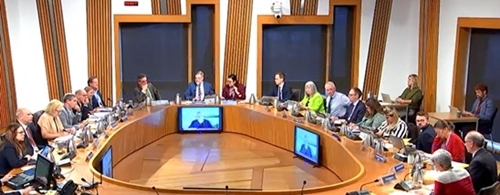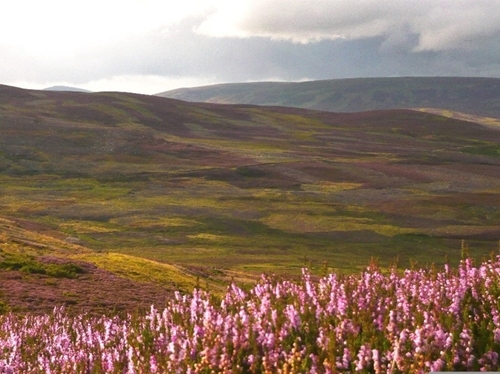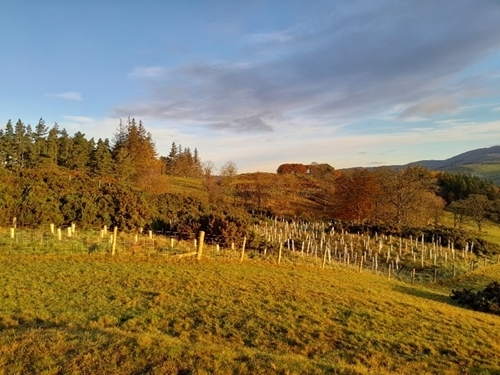By Ross Macleod, Head of Policy (Scotland)
If we hoped for some respite from the weight of policy consultations, bills and legislation that confronted us in 2023, the barrage has continued unabated so far this year. Current activity extends across Managing Deer for Climate and Nature, an upcoming Environment Bill, Habitat Regulations, components of the Agriculture Bill, Land Reform, and of course, the conclusion of the Wildlife Management and Muirburn Bill, which will introduce grouse shoot licensing from August 2024.
 GWCT Scotland attended a variety of Rural Affairs & Islands Committee
GWCT Scotland attended a variety of Rural Affairs & Islands Committee
evidence sessions at Holyrood during 2023
There is no doubt that global concerns regarding the twin crises of climate change and biodiversity loss are concentrating national and international government minds. The concerns are not going away. However, as previously observed, with over 70% of Scotland’s land area managed by farmers, keepers and other land managers, it is essential that Scottish Government and its agencies engage with our working conservationists as a key part of solutions, rather than viewing them as problems that need to be legislated into submission. In consultation responses to Scottish Government, we have referred to the Scottish Regulators’ Code of Strategic Best Practice, which requires agencies such as NatureScot to balance enforcement with support and guidance to achieve sustainable economic outcomes. Scottish Government must reach out to landowners and managers to help deliver environmental outcomes at sufficient landscape scale if progress is to be made.
For this to happen, legislation will need to balance rules with incentives. This, at a time when public funding budgets are under intense pressure. The recent 40% reduction in government support for forestry grants is a case in point. How does that square with the national objective of substantially increasing woodland cover? Agricultural funding support will probably follow the same downward trajectory in time. What will that mean for encouraging appropriate trade-offs between productive farming, biodiversity stewardship, and food security?
It appears that Scottish Government is placing a very large bet on private sector funding and investment in natural capital to cover public funding reductions and provide heavy-lifting capacity to deliver all the targeted environmental gains it expects from ambitious legislation. Yet we have no firm governance framework in place to provide buyers and sellers with either market rules or confidence that trading will operate within guidelines. Although Scottish Government issued the Interim Principles of Responsible Investment in Natural Capital in March 2022, it seems there is no urgency to implement market requirements. It must show leadership to establish a framework that fits with the current crop of environmental legislation.
 Upland gamekeepers could be key to delivery of carbon sequestration (Credit: Adam Smith)
Upland gamekeepers could be key to delivery of carbon sequestration (Credit: Adam Smith)
GWCT Scotland continues to push for landscape-scale facilitation funding to incentivise collaborative work on environmental plans and actions as an efficient use of public funding budgets. This is as important for deer managers (lowland and upland) and moorland managers as it is for farming groups. Such funding has been successful in England, leading to the formation of over 100 management clusters and some 400,000 hectares of land with ground-up leadership focused on conserving local species and habitats.
Within Scottish Government’s vision for agriculture, the biodiversity gains that farmers will be expected to deliver will follow an evidence-based approach. We agree that outcomes provide direction, but it is also critical that a culture of ‘trial-monitor-adjust’ alongside these aims is accepted as we learn what works and where we may need to change course to meet targets. This should apply equally to the full range of land uses and management, including the as yet unknown consequences from rewilding. An increase in woodland cover can provide sequestration benefits whilst riparian planting can help to reduce water temperatures and improved habitat that support fish. However, it will also encroach on the habitat of vulnerable ground-nesting species such as curlew and lapwing, whilst also extending the range of predatory species. There are likely to be positives and negatives in the quest for biodiversity net gain.
 Carbon and biodiversity gains from tree planting, but potential losses too? (Credit: Ross Macleod)
Carbon and biodiversity gains from tree planting, but potential losses too? (Credit: Ross Macleod)
I’ve said before that it is vital that we don’t inadvertently solve one set of environmental problems only to create other more intractable difficulties, particularly where there is a lack of evidence. Ultimately, Scottish Government is going to need the help of our working conservationists to meet environmental challenges and fill information gaps. In the current welter of legislative activity, whether it fully recognises this right now is a moot point.